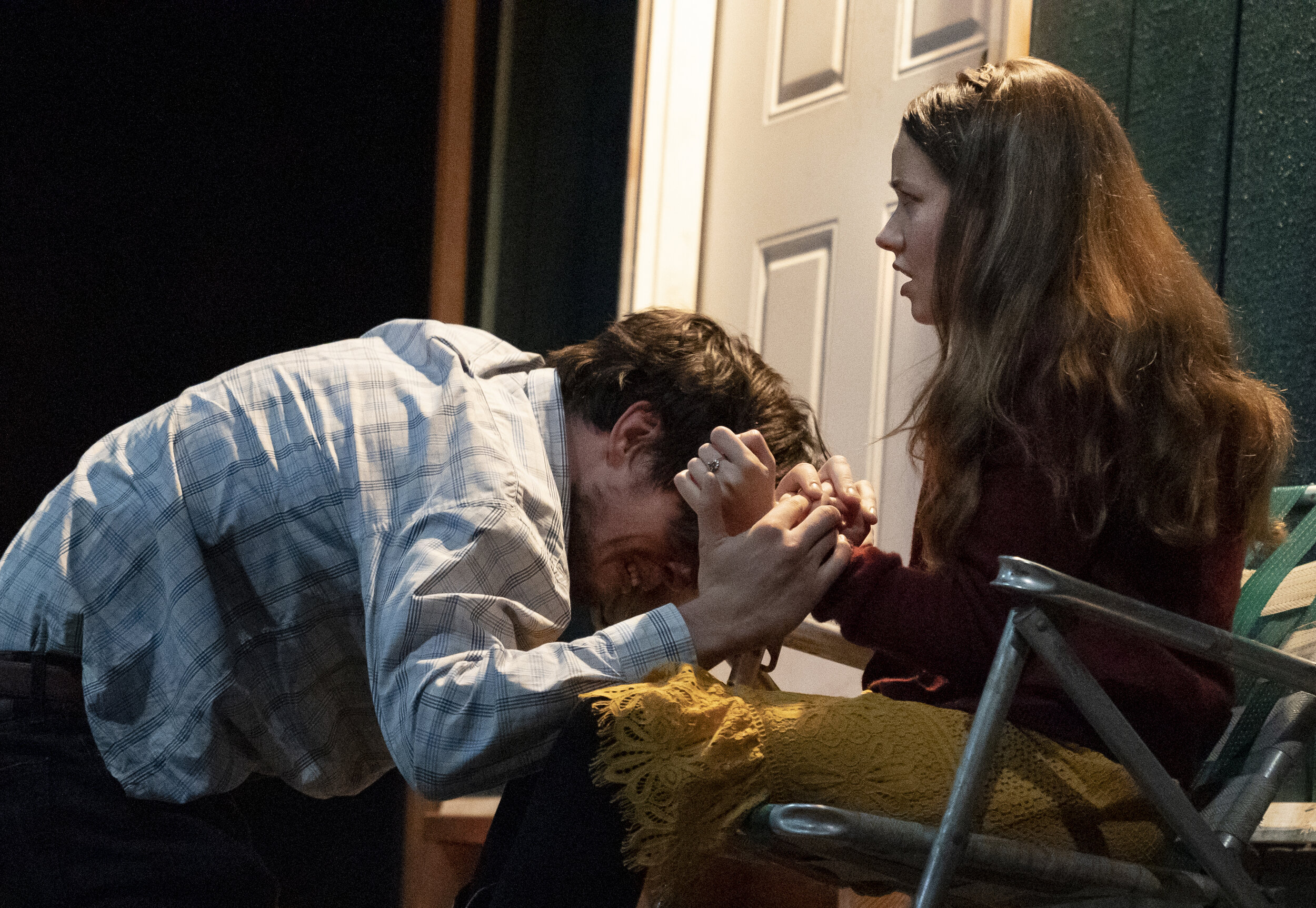Michele Pawk plays Gina, John Zdrojeski is Kevin, and Zoe Winters is Teresa in Will Arbery’s Heroes of the Fourth Turning.
Playwrights Horizons is currently housing an unexpected thing in New York City: conservatives openly discussing their beliefs. And liberal New Yorkers are, and should be, flocking to it. Providing a respite from the shock-jock conservatism of Donald Trump and Fox News, Will Arbery’s new play Heroes of the Fourth Turning puts Catholic conservatism onstage in all of its messiness and nuance, daring its audience to listen to what the other side has to say—and maybe even making them care about the characters doing the talking.
Pawk with Jeb Kreager as Justin.
Directed by Danya Taymor, Heroes situates itself in Lander, Wyo., the home to a private, Catholic liberal arts college. The action is set in 2017 between the Charlottesville “Unite the Right” rally and the solar eclipse, as graduates of the college reunite to pay tribute to beloved professor Gina (Michele Pawk) as she becomes the school’s new president. A post-inauguration party is winding down, and the revelers have dwindled down to host Justin (Jeb Kreager), a stoic ex-Marine who shoots a deer in the show’s opening moments; Gina’s kindhearted daughter Emily (Julia McDermott), who’s suffering from chronic Lyme disease; Teresa (Zoe Winters), an Ann Coulter–esque Brooklynite and conservative blogger; and Kevin (John Zdrojeski), the self-described “holy fool” whose whiskey intake has him stumbling around the stage and openly lamenting his lack of a girlfriend.
As the four hang around Justin’s yard waiting for Gina to arrive, they discuss their beliefs—the likes of which the audience is very unlikely to share. (“I don’t think it’s healthy to be around LGBT activity,” Justin says.) But these conversations largely aren’t the sensationalist rhetoric one hears on Fox News; rather, they’re considered critiques, which—while often completely repugnant to liberals—are intelligently, passionately debated to show the spectrum of conservative thought, as characters quote scholars and refer to concepts like “Cartesian ‘neo-Gnosticism’” to explain the “other side.” The group’s conservatism as an extension of their Catholicism sparks debates about abortion and Trumpism, and they consider how their religious ideology aligns with today’s Republican Party. (Bannonist Teresa thinks Trump is “a Golem molded from the clay of mass media and he’s come to save us all,” while Kevin says, “After I voted for Trump I vomited next to my car.”)
The debates don’t necessarily offer any big conclusions about conservatism, and the arguments are insightful but sometimes frayed in the way that a real late-night, alcohol-fueled debate would be. But while the conversations are unlikely to change any liberal minds, Arbery has made them undeniably electrifying despite their content, delivered with an energetic sense of intelligence and witty, well-constructed prose that makes Democrats listen carefully to words they’d typically dismiss. One of Teresa’s fiery monologues—which decries the “liberal future” and says “Thank God” Trump got elected—even elicited applause.
For those who appreciate passionate debate and intellectual argument, then, Heroes can be thrilling theatre. Ensuring that the work is more compelling drama than conservative thought exercise, Arbery mines his characters’ fraught relationships with one another alongside their ideological debate and brings in a haunted sense of mysticism that gives the piece an uneasy edge. (Laura Jellinek’s shrouded set further evokes this eeriness while suggesting the sparse, natural vastness so unique to Wyoming’s landscape.)
Kevin (John Zdrojeski) seeks consolation from Emily (Julia McDermott) in Heroes of the Fourth Turning. Photographs by Joan Marcus.
The conservative dialogues are made all the more palatable by the performances, as the cast elevates the characters from right-wing ideologues into multidimensional people. Winters displays a no-holds-barred confidence that invigorates the stage despite her far-right views, and McDermott’s loving yet pained performance captures the essence of a character whose vibrant soul doesn’t match her constrained body. Kreager’s grizzled, yet understated and polite demeanor is spot-on Wyomingite, while Zdrojeski’s performance navigates the fine line between pathetic and charismatic.
But how is the liberal audience meant to receive these multifaceted members of the “other side”? Teresa eschews the idea of liberal empathy as “empty” and “politically irresponsible,” claiming that they instead just “need to know how to think how [liberals are] thinking. From a distance.” “Comprehending each other’s thinking is the only possible political corrective,” she adds.
Arbery’s approach seems to lie somewhere in between empathy and analysis, presenting conservative arguments in a way that’s more human than reading conservative scholarship but doesn’t make the audience necessarily relate to their feelings. Rather, Arbery has simply laid out these characters for who they are—conflicted, complicated people who are simultaneously defined by, and more than, the views they hold. Whether this mode of understanding the right will be the “political corrective” Teresa suggests to heal our partisan divide remains to be seen—but it makes for tremendous theater nonetheless.
Heroes of the Fourth Turning plays through Nov. 10 at Playwrights Horizons (416 W 42nd St.). Evening performances are at 7 p.m. Tuesday and Wednesday, and at 8 p.m. Thursday through Saturday, and 7:30 p.m. on Sunday; matinees are at 2:30 p.m. Saturday and Sunday. For tickets, visit playwrightshorizons.org.





